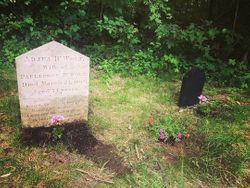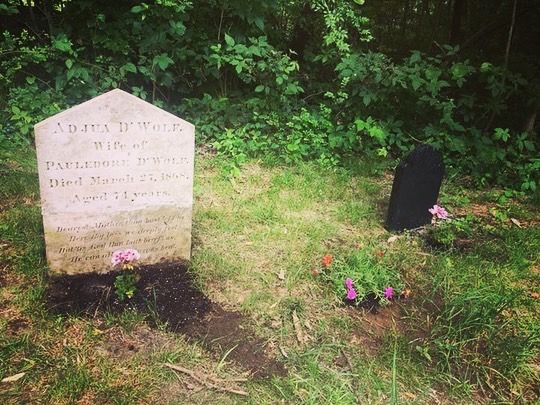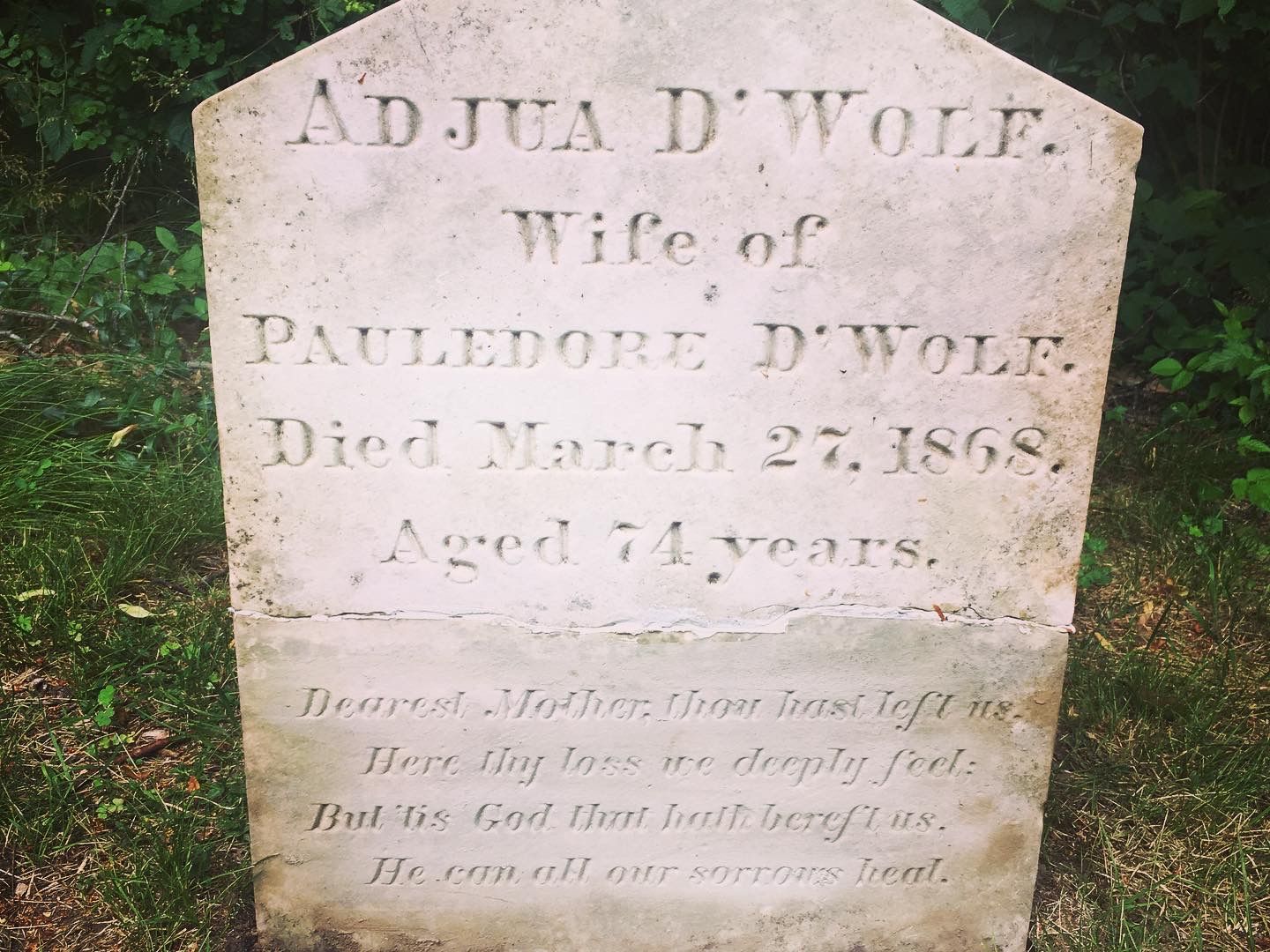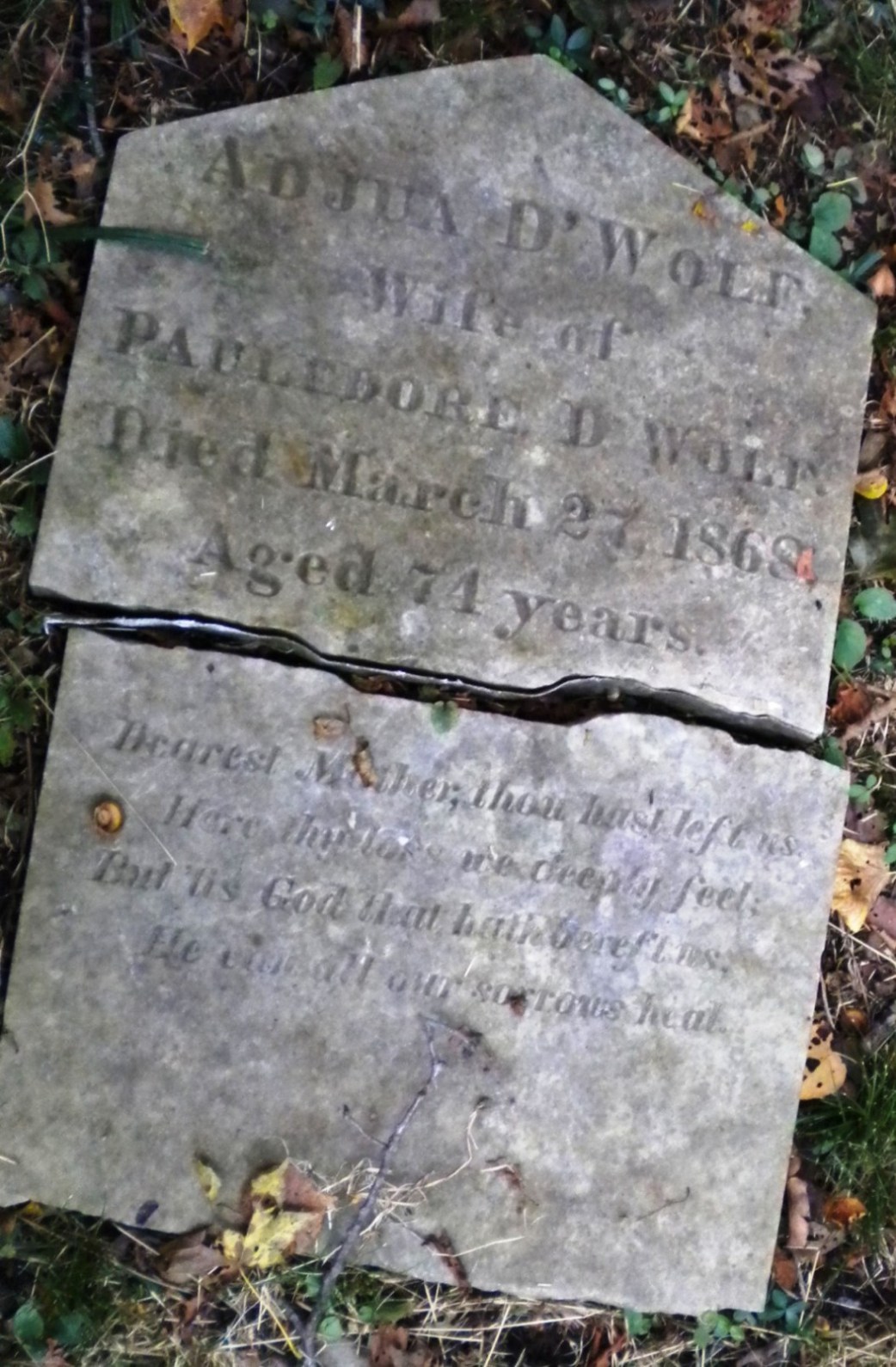From the book:African American Historic Burial Grounds and Gravesites of New England
By Glenn A. Knoblock
Less famous and mostly overlooked are several graves for slaves of the DeWolf family, located on the far left of the main cemetery near the wooded border. The most prominent is that for Adjua D'Wolf (1794-1868), the woman who was brought to Bristol directly from Africa as a Christmas present in 1803. Interestingly, Adjua was allowed to retain her African given name (for those girls born on a Monday). The other half of this Christmas gift to Nancy DeWolf was a young boy, Pauledore, who later became Adjua's husband. His burial site in this cemetery is unmarked. Both were said to be favorites of the DeWolf family, and in their later years they lived in a separate cabin on the DeWolf estate and were pleasant to the many visitors who passed by.
The presence of Adjua and Pauledore in the DeWolf household was a large one, since they not only worked for the family, but at a young age may have served as playmates to the DeWolf children. As they grew older, these favorite slaves worked on the estate, cared for their children, and were even the subject of a tune or nursery rhyme that has remained in the family lore for over two hundred years.
It goes as follows:
Adjua and Pauledore
Sitting in the cellar way
Down fell the cellar door
Bump went Pauledore
Up flew the cellar way
Off blew Adjua!
...
In regards to Pauledore and Adjua, white anecdotal accounts suggest that they were happy with their lives. When the abolitionist movement gained ground in Bristol, the DeWolf family is said to have discussed the possibility of returning Adjua and Pauledore to Liberia in Africa, but that they were unwilling to go. Whether or not Adjua and Pauledore had any children is uncertain, but Alexander DeWolf (born ca. 1818 in Rhode Island) a black seaman living in Bristol in 1850, may have been their son, while Ruth DeWolf (born ca. 1825 in Rhode Island), a black servant working in Bristol in 1870, is of sufficient age to have been their daughter. As was the case with many latter-day slaves in New England who had aged while in their masters' employ, Adjua and Pauledore's duties likely lessened in their older years and they were supported by the DeWolf family until they died. When Pauledore D'Wolf died, and whether or not his grave was originally provided with a marker, is unknown; that for his wife Adjua is broken in two and lying on the ground. The only other stone for an African American is that for Judith Honeyman (died 1831), who is listed as a "faithful servant," but whether or not she worked for the DeWolf family is unknown, and efforts to track down her life details have been unsuccessful.
From the book:African American Historic Burial Grounds and Gravesites of New England
By Glenn A. Knoblock
Less famous and mostly overlooked are several graves for slaves of the DeWolf family, located on the far left of the main cemetery near the wooded border. The most prominent is that for Adjua D'Wolf (1794-1868), the woman who was brought to Bristol directly from Africa as a Christmas present in 1803. Interestingly, Adjua was allowed to retain her African given name (for those girls born on a Monday). The other half of this Christmas gift to Nancy DeWolf was a young boy, Pauledore, who later became Adjua's husband. His burial site in this cemetery is unmarked. Both were said to be favorites of the DeWolf family, and in their later years they lived in a separate cabin on the DeWolf estate and were pleasant to the many visitors who passed by.
The presence of Adjua and Pauledore in the DeWolf household was a large one, since they not only worked for the family, but at a young age may have served as playmates to the DeWolf children. As they grew older, these favorite slaves worked on the estate, cared for their children, and were even the subject of a tune or nursery rhyme that has remained in the family lore for over two hundred years.
It goes as follows:
Adjua and Pauledore
Sitting in the cellar way
Down fell the cellar door
Bump went Pauledore
Up flew the cellar way
Off blew Adjua!
...
In regards to Pauledore and Adjua, white anecdotal accounts suggest that they were happy with their lives. When the abolitionist movement gained ground in Bristol, the DeWolf family is said to have discussed the possibility of returning Adjua and Pauledore to Liberia in Africa, but that they were unwilling to go. Whether or not Adjua and Pauledore had any children is uncertain, but Alexander DeWolf (born ca. 1818 in Rhode Island) a black seaman living in Bristol in 1850, may have been their son, while Ruth DeWolf (born ca. 1825 in Rhode Island), a black servant working in Bristol in 1870, is of sufficient age to have been their daughter. As was the case with many latter-day slaves in New England who had aged while in their masters' employ, Adjua and Pauledore's duties likely lessened in their older years and they were supported by the DeWolf family until they died. When Pauledore D'Wolf died, and whether or not his grave was originally provided with a marker, is unknown; that for his wife Adjua is broken in two and lying on the ground. The only other stone for an African American is that for Judith Honeyman (died 1831), who is listed as a "faithful servant," but whether or not she worked for the DeWolf family is unknown, and efforts to track down her life details have been unsuccessful.
Inscription
Dearest Mother thou hast left us.
Here thy loss we deeply feel;
But ‘tis God that hath bereft us,
He can all our sorrows heal.
Advertisement
Explore more
Sponsored by Ancestry
Advertisement




